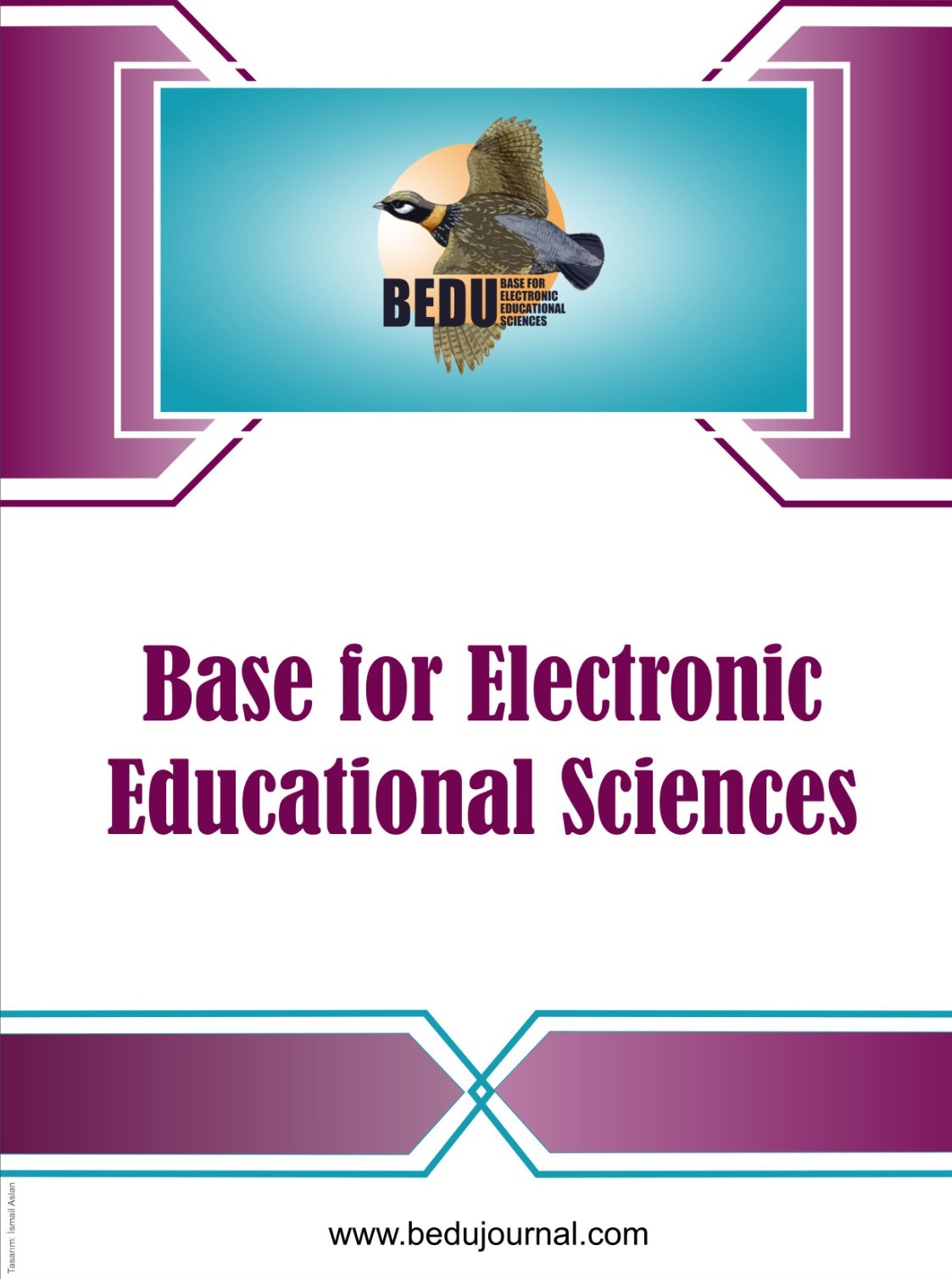Research article | Open Access
Base for Electronic Educational Sciences 2024, Vol. 5(2) 57-73
Analysing the Messages Received by Prospective Turkish Language Teachers from Their Environment in Terms of Gender Roles
pp. 57 - 73 | DOI: https://doi.org/10.29329/bedu.2024.1064.4
Publish Date: September 30, 2024 | Single/Total View: 125/184 | Single/Total Download: 169/203
Abstract
Gender roles affect individuals in society in every aspect from the distribution of responsibilities within the family to the choice of profession and job, from clothing style to behavioural characteristics. Each individual is affected by this influence process to a different extent in different subjects. Because each family instils codes similar to the cultural structure in which it is located. The individual continues to apply these codes in the socialisation process. After the family, the first socialisation area begins to experience these roles in educational institutions. In the educational environment, students encounter people who will be role models for them. In this context, in this study, it was aimed to examine the messages received from their environment during the socialisation process of Turkish language teacher candidates from different age groups studying at a state university in western Turkey in terms of gender roles. In the study, a personal information form and a semi-structured form were used to collect data for each participant. The semi-structured form consisted of 3 open-ended questions related to the scale. The form was asked to the field experts before the application. It was finalised by making arrangements in line with the feedback from the field experts. Of the Turkish language teacher candidates participating in the study, 69.7% were female students and 30.3% were male students. In line with the findings obtained from the research, it is possible to say that male participants received more messages from their parents and friends about expressing their feelings about the traditional gender role and appearing strong, while female participants were exposed to messages focused on placing women in a more passive and passive position and dragging them to a secondary status.
Keywords: Gender, Gender Roles, Teacher Candidates
APA 7th edition
Ozhan, Y., & Kana, F. (2024). Analysing the Messages Received by Prospective Turkish Language Teachers from Their Environment in Terms of Gender Roles. Base for Electronic Educational Sciences, 5(2), 57-73. https://doi.org/10.29329/bedu.2024.1064.4
Harvard
Ozhan, Y. and Kana, F. (2024). Analysing the Messages Received by Prospective Turkish Language Teachers from Their Environment in Terms of Gender Roles. Base for Electronic Educational Sciences, 5(2), pp. 57-73.
Chicago 16th edition
Ozhan, Yasemin and Fatih Kana (2024). "Analysing the Messages Received by Prospective Turkish Language Teachers from Their Environment in Terms of Gender Roles". Base for Electronic Educational Sciences 5 (2):57-73. https://doi.org/10.29329/bedu.2024.1064.4
Arıcı, F. (2011). Üniversite öğrencilerinde toplumsal cinsiyet rollerine ilişkin algılar ve psikolojik iyi oluş. Yayınlanmamış Yüksek Lisans Tezi. Hacettepe Üniversitesi, Sosyal Bilimler Enstitüsü, Ankara.
Ayten, K. B. (2021). İlkokul Türkçe ders kitaplarındaki metinlerde kültürel değerler. OPUS International Journal of Society Researches, 18 (40), 2168-2190. https://doi.org/10.26466/opus.902826.
Bayar, Ö. Avcı, H. Ö. ve Koç, M. (2018). Erkek toplumsal cinsiyet rolü stresi ölçeği’nin (ETCRSÖ) geliştirilmesi: Geçerlik ve güvenirlik çalışması. Abant İzzet Baysal Üniversitesi Fakültesi Dergisi, 18(1), 57-76.
Connell, R. W. (2005). Work/life balance, gender equity and social change” Australian Journal of Social Issues, 40 (3), 369-383.
Çeçen, M. A. (2015). Türkçe Ders Kitaplarında Toplumsal Cinsiyet Rolleri. D. Uçgun ve A. Balcı (ed.). içinde Prof. Dr. Murat Özbay’a Armağan. (s. 1-17). Pegem Yayıncılık: Ankara.
Çetin, D. Y. ve Mangır, M. (2021). Çocuk kitaplarında cinsiyet algısının dile yansıması. Ana Dili Eğitimi Dergisi, 9 (1), 166-187.
Çiçek, B. ve Çopur, Z. (2018). “Bireylerin kadınların çalışmasına ve toplumsal cinsiyet rollerine ilişkin tutumları”. International Journal of Eurasian Education and Culture, (4), 1-21.
Çimen, L. K. (2019). Eğitim fakültesi öğrencilerinin rol model tercihleri. Manas Sosyal Araştırmalar Dergisi, 8 (1), 88-110.
Çınar, K. E. (2013). Ortaokul türkçe ders kitaplarında toplumsal cinsiyet. Yayınlanmamış Yüksek Lisans Tezi. Pamukkale Üniversitesi, Eğitim Bilimleri Enstitüsü, Denizli.
Çolak, G. (2018). Türk edebiyatında kelimelerin toplumsal cinsiyeti”. Türklük Bilimi Araştırmaları, (43), 87-125.
Gürbüz, S. ve Şahin, F. (2018). Sosyal bilimlerde araştırma yöntemleri. Seçkin Yayıncılık: Ankara.
Karabulut, A. (2021). Toplumsal cinsiyet rolleri açısından 8. sınıf Türkçe ders kitabının incelenmesi. Anasay, (16), 119-131. https://doi.org/10.33404/anasay.921848.
Karasar, N. (2011). Bilimsel araştırma yöntemleri. Ankara: Nobel Yayınları.
Kılıç, L. K. ve Eyüp, B. (2011). İlköğretim Türkçe ders kitaplarında ortaya çıkan toplumsal cinsiyet rolleri üzerine bir inceleme. Ordu Üniversitesi Sosyal Bilimler Enstitüsü Sosyal Bilimler Araştırmaları Dergisi, 2(3), 129-148.
Kuluroğlu Sevinç, M. ve Kana, F. (2019). Türkçe öğretmeni adaylarının toplumsal cinsiyet algıları. International Social Mentality and Researcher Thinkers Journal, 5(25): 1600-1614
Köse, M. ve E. Demir. (2014). Öğretmenlerin rol modelliği hakkında öğrenci görüşleri. Uluslararası Sosyal ve Ekonomik Bilimler Dergisi. 4 (1), 08-18.
MEB. (2019). İlköğretim Türkçe dersi öğretim programı. Ankara: Milli Eğitim Yayınevi.
Ölçek, G. S. (2020). Ebeveynden algılanan davranışsal ve psikolojik kontrolün ve toplumsal cinsiyet rolüne ilişkin algıların aleksitimi ile ilişkisi. Yayınlanmamış Yüksek Lisans Tezi. İstanbul Okan Üniversitesi, Sosyal Bilimler Enstitüsü, İstanbul.
Özaydınlı, E. (2024). Üniversite Öğrencilerinde Toplumsal Cinsiyet Rolleri, Öz Şefkat ve Psikolojik Dayanıklılığın Beden İmgesi Baş Etme Stratejilerini Yordamadaki Rolü. Yayınlanmamış Yüksek Lisans Tezi. Ege Üniversitesi, Eğitim Bilimleri Enstitüsü, İzmir.
Özbaşı, S. ve Kalenderoğlu, İ. (2020). Türkçe eğitimi ve çocuk edebiyatında “toplumsal cinsiyet” üzerine yapılmış lisansüstü tezlerin değerlendirilmesi. IBAD Sosyal Bilimler Dergisi, 84-94.
Satılmış, S. (2019). 5. Sınıf Türkçe ders kitabının toplumsal cinsiyet. Eskişehir Osmangazi Üniversitesi Sosyal Bilimler Dergisi, 20 (Özel Sayı), 1249-1262. https://doi.org/10.17494/ogusbd.555475.
Soylu, A. ve Esen, Y. (2022). Öğretmenlik meslek seçimi ve meslek kimliğinin kurulumunda toplumsal cinsiyetin rolü. Bolu Abant İzzet Baysal Üniversitesi Eğitim Fakültesi Dergisi, 22 (3), 1102-1121.
Şencan, H. (2005). Sosyal ve davranışsal ölçümlerde güvenilirlik ve geçerlilik. Ankara: Seçkin Yayıncılık.
Tan, M. (2000). Eğitimde kadın erkek eşitliği ve Türkiye gerçeği, kadın erkek eşitliğine doğru yürüyüş. TUSIAD: İstanbul.
Torun, Y. (2002). Genderbias in student-teacher ınteractions and its effect on reproduction of gender roles in the classroom. Yayınlanmamış Yüksek Lisans Tezi. ODTÜ Sosyal Bilimler Enstitüsü, Ankara.
Yaylı, D. ve Çınar, K. E. (2014). Ortaokul Türkçe ders kitapları görsellerinde toplumsal cinsiyet. Journal of Turkish Studies, 9(5), 2075-2096. http://dx.doi.org/10.7827/TurkishStudies.6870.
Yıldırım, A. ve Şimşek, H. (2021). Sosyal bilimlerde nitel araştırma yöntemleri. Seçkin Yayıncılık: Ankara.
